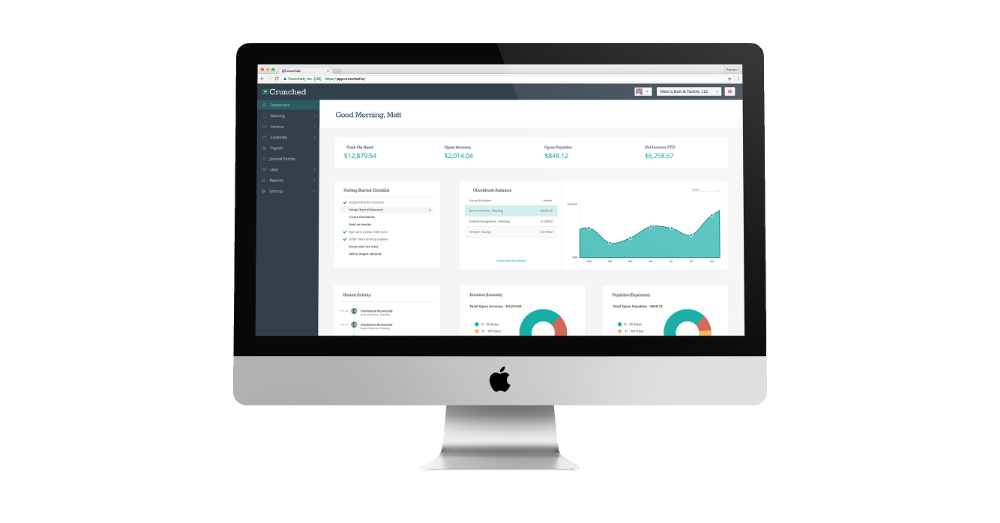How Cloud Accounting Software Changed Bookkeeping
By Matt Reims
Technology has made all of our lives more interesting. For those involved in running or managing a small business, technology is continually allowing us to manage our tasks faster and with more ease. An array of online apps, software, and platforms available are automating a variety of processes and helping us be more organized and produce more accurate results. For small business owners, bookkeepers, office managers, and accountants, cloud accounting software has been a game changer.
If you’re a small business owner, you may have avoided managing your businesses finances in the past. If you’re a bookkeeper, then you know how cumbersome bookkeeping used to be. The process involved keeping track of a variety of loose documents, like receipts and invoices. This made it hard to keep your financial documents organized. And spreadsheets required time-consuming manual data entry. Cloud accounting software has brought all of your financial data and processes together in one easy-to-use platform.
Once a small business embraces all that cloud accounting software has to offer, it’s easy to forget how much more difficult bookkeeping was without it. Here are just a few of the ways that technology has changed accounting for the better.
1. Financial information Is Easier to Access
Small business owners, bookkeepers, and accountants are no longer tied to a stationary device that houses all of the company’s financial information. When your accounting software is stored on the cloud, anyone with access to the account can view the information from any device that has an internet connection.
This also means in-person meetings aren’t as necessary — or, at least, they don’t have to occur as often. Accountants have all of the information they need to help you file your taxes or provide any other financial services or advice as long as they can access the account.
2. Cloud Accounting Systems Are Easy to Use
Prior to cloud accounting software, bookkeeping was largely done by hand or by manually inputting data into a spreadsheet. This is a recipe for miscalculations due to human error. Now, you don’t have to be a math whiz to do your books. If you connect your business bank accounts to your software platform, every transaction you make will be tracked online.
When it’s time to file your taxes or reconcile your accounts, all you have to do is log in and mark which transactions are business expenses and profits, and the software will calculate your profits or losses. There is very little math required on your part to effectively manage your company’s finances.
3. The Bookkeeping Process Is More Streamlined
Cloud accounting software lets you keep all of your financial records and bookkeeping notes in one place. Platforms like Crunched display all of your financial information on an easy-to-read dashboard. Here, you can easily view how much cash you have on hand, how many invoices you have outstanding and their total worth, and your company’s current net income.
Cloud accounting software platforms can also help make your invoice processing simple to manage and streamlined. After you’ve delivered your product or provided a service, you can create an invoice and send it to your client directly from your accounting platform. You can also use cloud accounting software to stay on top of invoicing by setting up automatic reminders that will go out to your clients so you don’t have to habitually check your records to determine who owes you what.
If you are new to cloud accounting software, know that most systems will have tutorials to show you how to create an invoice, reconcile your account, and manage cash flow.
4. You Can Get Updates in Real Time
Your cloud-based accounting software is working even when you and your team are not. In other words, the system will keep all of your financial information up to date 24/7, without anyone having to manually update or input transactions. If you want to see how much money is in your small business bank account or which invoices are outstanding, all you have to do is log in.
5. Your Financial Information Is More Secure
Working with a cloud-based software system eliminates the potential of losing your company’s sensitive information due to a system crash. The cloud hosts your data remotely, so water damage and power surges are no longer a factor when it comes to losing value information because of unforeseen circumstances.
Cloud accounting software will protect your data from not only damage but also theft. Crunched, for example, uses bank-level encryption, auto backups, and data redundancy to keep its clients’ information out of the wrong hands. Other features include dual authentication for login and account retrieval, and account administration and roles management setup to prevent unwanted users from performing certain tasks.
Managing business finances has often been a time-consuming and tedious task for small business owners and bookkeepers while also being one of the most vital. The bookkeeping portion of the job still requires some general financial acumen, but thanks to cloud accounting software, it is certainly much easier to manage.


